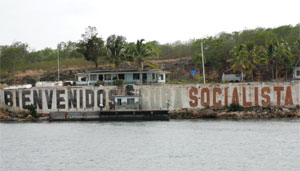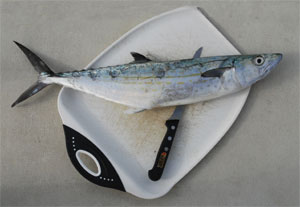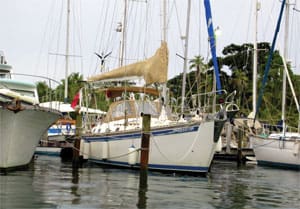To the editor: I have a Dutch sailing friend who I’ve overheard making phone calls in her native tongue to her family back home. I’ve also seen her chatting in flowing Spanish with the stallholders at a market in Costa Rica, and listened as she hailed the port captain in the Marquesas Islands in flawless French. So, as we clink glasses in our cockpit in Fiji, I tease her (in English) about just how jealous I am of her linguistic skills. Because, quite frankly, being fluent in another language when world cruising would definitely have come in handy in our travels so far.
Our windlass stopped working in Panama, and I remember that at every stop we made in the 2,500 miles we covered between there and Puerto Vallarta, Mexico, we were making inquiries in appallingly broken Spanish about how best to fix it. So there we were, lugging around an exceedingly heavy lump of metal and imploring every mechanic we could find to help.
“It’s the motor … el motorrrrr,” I said, heavily rolling the last ‘r’ in hopes that the extra emphasis would somehow more clearly indicate the full detail of the problem. “It’s broken, roto, the oil … um … aceite, is leaking. You know, escape, ess-kap-haaay.”
But sadly my attempts were mostly met with raised eyebrows and incomprehensibly fast responses of highly technical language that went over my head completely.
In Portugal, it took me the longest time to understand that a well-meaning chap working on the dock we’d just tied up to was not just making small talk about our trip and was instead signalling that we had mistakenly come alongside the police berth.
 |
|
A sign in Spanish on entering Cuba. |
|
Jessica Lloyd-Mostyn |
“Ahhhh, não permitido, per-mee-tee-doh, not allowed, police only. Okay I get it, sorry sorry, desculpa.”
Later I was lucky to find I still had enough British General Certificate of Secondary Education French in the back of my head to splutter out “we have arrived, nous sommes arrivés” over the VHF when we pulled into Martinique, but was subsequently flummoxed by a rapid fire of questions relating to length, beam and draught.
In St. Martin or Sint Maarten, the Caribbean island divided between two nations, I had the option to ditch the French altogether in favor of Dutch but was able to progress no further in my conversations than “we live on a boat, we wonen op een boot” before people would sympathetically switch gracefully back to impeccable English.
The port captain in Santiago de Cuba practically begged me to give up the pretense of my attempt to communicate with him in Spanish and simply entreated, “Only English please lady, solo Inglés.” I was beginning to feel like my efforts were completely laughable and resembled the Monty Python Hungarian phrasebook sketch.
I did attempt to practice more though. We would often end up in strange hybrid conversations of two languages fighting for breathing space. I remember a local Panamanian speaking perfect English while I was stumbling along with my Spanish replies. James wanted a knife to take diving with him, and I stubbornly and repeatedly pressed the shopkeeper at the fishing store to point me toward a “cuchara pescado, for killing the fish.”
“Please, just tell me in English. What is it that you want?”
 |
|
Jess Lloyd-Mostyn thought she was asking for a dive knife, but that’s not quite what her Spanish translation meant. |
|
Jessica Lloyd-Mostyn |
“A diving knife.”
He laughed out loud and caused me to blush deep red when he explained, “Oh! You mean a cuchillo, un cuchillo por buceo. You were just asking me for a fish spoon!”
Given my lack of linguistic talents, it’s probably surprising to many that we chose to have both of our boat babies en route in foreign countries. And I’ll admit that it was hard to commit to memory the Spanish for “no caesarean section unless it’s really necessary.” But at least after all our time in Mexico I did manage to stop saying “no comprendo” about everything.
Maybe I’ll fair better in Vanuatu, the next stop on our sailing itinerary, which boasts 115 native languages in addition to English and French. Many people there are bi- or trilingual, but Bislama — a creole language also known as Pidgin English — is the most commonly used. It’s a dialect that can seem a bit comical at first but is actually rather practical in its simplicity. Perhaps even I will be able to master a tongue that works in such a verbatim way.
So when dealing with our next bit of broken gear, I’ll need to explain, “Samting ia hemi bugarap” — literally, something here is buggered up. Sounds easy, right? Hmm, given my track record I wouldn’t be so sure.
—Jess Lloyd-Mostyn voyages aboard the Crossbow 42 Adamastor with husband James, daughter Rocket, son Indigo and daughter Autumn. Her website is www.water-log.com.

